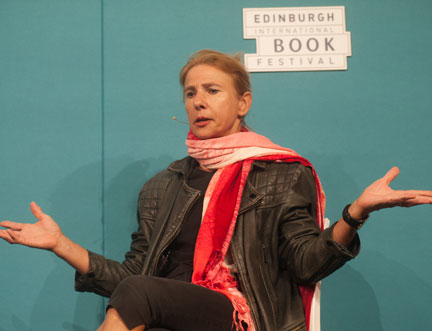More articles Saturday 20 August 2016 4:00pm
Lionel Shriver on Politics and Presidents

“I gave Donald Trump the idea for running for President,” Lionel Shriver told her packed Book Festival audience with a wry smile. Referring to The Mandibles, her latest novel set in a broken America of the not so distant future, when the country has become a pariah nation, the dollar has crashed, the middle classes are reeling, and the Mexicans have built a wall to keep out the Americans, she deadpanned, “I swear he got hold of a proof copy.”
Shriver has long had an alarming capacity for predicting the future and capturing the darkness of our present. This led chair Ruth Wishart to refer to her as “the Mystic Meg of modern fiction”, and a writer “whose crystal ball never goes cloudy”. Her fiction, as the glowing New York Times review of The Mandibles put it, is “uncannily of its moment”, whether she’s writing about a massacre in a school (We Need To Talk About Kevin) or obesity (Big Brother). The Mandibles, she explained, is set in the 2020s and 2040s but it is less a dystopian novel about the future and more a fiction about “the fears we contract in the present”. And what we fear right now is economic meltdown. “All you have to do is take away everyone’s virgin olive oil and the middle classes start to riot,” Shriver joked.
“I do find Trump very frightening”, she continued, “and I don’t believe he is going to be elected… but that doesn’t make it less appalling that he is as close as he is. He is inarticulate, boorish, a braggart, an unattractive man on every single level.” As for whether there is a parallel to be drawn between the disenfranchised white working classes allowing for the rise of a “demagogue” like Trump in the US and Brexit in the UK, Shriver, who continues to base herself between her native America and adopted England, rejected comparisons. “It’s not fair to the British people who voted for Brexit,” she said. Clearly aware she was speaking in a country that voted overwhelmingly in favour of remaining in the EU, she chose not to disclose, as she has openly in interviews, that she was a supporter of the Leave campaign. “There is a cogent case for leaving the EU which isn’t necessarily racist or zenophobic,” she continued carefully. “I don’t want to insult Brits by making that parallel.”
Shriver said she would vote for Hillary Clinton but wished she could do so “with a little more enthusiasm”. Her reluctance has nothing to do with personality: what bothers Shriver is that the first female president of the United States had to be married to a male president in order to get to the White House. “She would not be in this position, nor would she have been New York Senator or Secretary of State, without him. I don’t like that story. It bothers me.” Wishart probed: Would she prefer Michelle Obama? “Yes,” Shriver replied unequivocally. And she is going to miss Barack Obama desperately: “I’ve been so happy just to have a president with a sense of humour.”
There were laughs, many of them bitter, but this was a sobering and often frightening session in the company of an uncompromising writer who always says precisely what she thinks, in person and on the page. In the face of increasing political and economic instability, Shriver is now known as much for her fierce and provocative commentary as she is for her fiction, and the questions from the audience reflected this change in perception. Her views were sought on everything from the economy, immigration, taxes, religious fundamentalism, and even quantitative easing to the problems facing younger generations, for whom she displays particular sympathy in The Mandibles. “But this is not a book of solutions,” Shriver warned. “It is only about the problems… which seem to be my speciality.”

 Major new partnership with Celtic Connections
Major new partnership with Celtic Connections 

